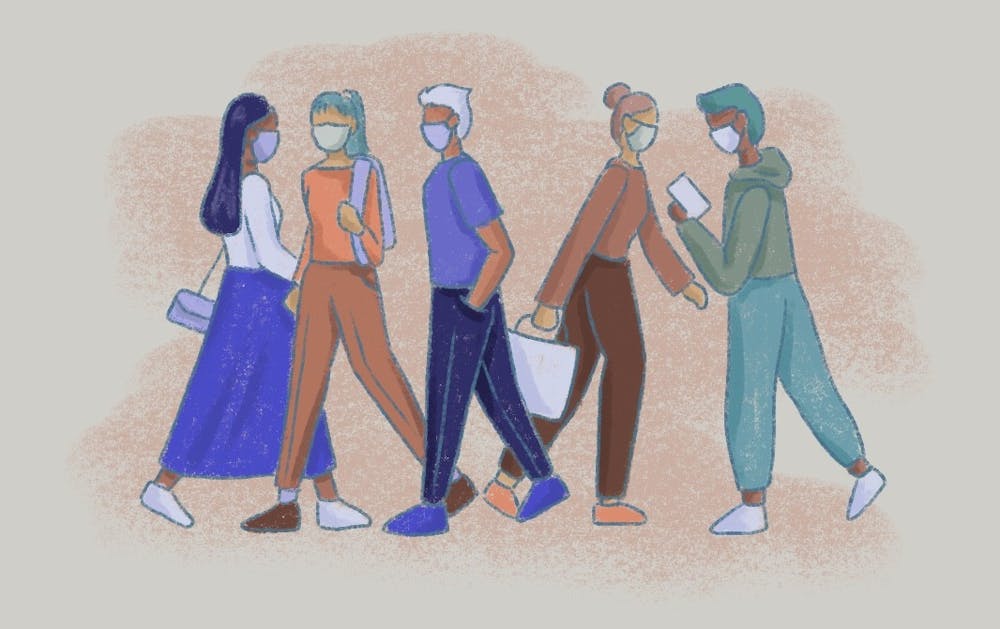The swollen individual responsibility in slowing the spread of the virus has produced some unavoidable exhaustion
By now, many Americans enduring the ongoing pandemic are adhering to face mask guidelines and other safety measures implemented in a trickling fashion across the nation, and they're also bearing the brunt of COVID-19's spread.
The pandemic, robber of my sanity and frivolous teenage lifestyle, was only just starting to find a foothold in the early months of the year. By early-March, it had grown apparent this was not a minor blip but rather an indefinite, all-encompassing viral tidal wave.
Mid-spring semester, I watched intently from abroad as domestic infection rates began to burgeon and universities scrambled to formulate a plan of action which, in ASU's case, was a two-week suspension of in-person instruction. It was nearly impossible for a layman like me to foresee the magnitude of the looming pandemic.
As I was already in a pandemic-induced agitated state prior to America's mass shutdowns, flying home from my spring break vacation was an episode of cramped anxiety and, unknowably, my last engagement with a crowd for the foreseeable future. I remember a fellow passenger, suddenly struck by a coughing fit, shrieking that she "didn't have the coronavirus, sir" after I shot her a nervous glance over my shoulder.
Upon returning to the dusty confines of Phoenix, all there was to do was sit at home and incessantly doomscroll, poring over news sites and my Twitter feed in the hopes of walking away with some clarity. Instead, I often found myself falling deeper into my already unwavering sense of dread.
As infection numbers and the death toll proliferated through the end of spring and into summer, I had begrudgingly adapted to my now-universal, reclusive lifestyle, with my venturing out of the house amounting to little more than walking my dog or briefly patronizing the nearby grocery store.
Disturbingly interchangeable television commercials that employed phrases like 'in these uncertain times' and 'our new normal' sprung up continually and eye-roll-inducing posts from celebrities seemed to be habitually shoved down my throat. It felt like the end of times, but I think it was just the acceleration of abject technocapitalism.
As the weeks toiled on and my family grew increasingly exhausted from enduring, what my mom still calls "this COVID crap," I chastised them for breaking self-directed quarantine. In retrospect I see that my moralistic berating was superfluous, as I was placing the bulk of the responsibility on singular individuals, what I believe many had become resigned to after suffering through the lamentable incompetence of our state and federal governments.
If we wanted to personify the vision of a hero this moment had begged us to become, our best bet was to avoid large crows, wear a mask, stay home and surely we'd stop the spread soon enough. It always seemed clear to me that without ubiquitous paid leave and a concrete federal overhaul of public health, we would be navigating our lethal new-normal indefinitely, and I would descend further into my desocialized, weary state.
I fear that the absence of decisive, life-saving government action in favor of a decentralized pandemic response may have propelled our nation into a primal condition, where presupposed hierarchies reign and the individualized responsibility of saving lives is the driving factor in determining our day-to-day routines.
Certainly I experienced this burden of personal responsibility, the covert terror that any action taken outside of the safety of my sheltered home could have an unintended ripple effect resulting in the death of a stranger's loved one. This fear was only worsened by the sparse avenues to be tested for the virus, leaving me wary of any interaction where I could unknowingly be dispersing airborne contagions.
As the upcoming hybrid semester, which I was certain would quickly be derailed by campus outbreaks, grew closer and my views on being forced to resume life shifted from perpetually concerned to quasi-indifferent, I decided to leave my mom’s home to move closer to campus and, absentmindedly, live with a stranger.
"How careful do you think you are in regards to the pandemic?" I typed and nervously texted my new roommate as a lime green determinant of my future safety. Much to my relief, he'd been equally as vigilant as me, with both of us now sporadically mentioning our weekly negative test results in passing.
Living in off-campus student housing near ASU's Downtown Phoenix campus has exposed me to a swarm of individuals whose metaphorical backs have been broken by pandemic fatigue and are choosing to frequent businesses, attempting to manufacture a sense of normality amid an ongoing global health crisis.
Myself, along with many people I know, are succumbing to our desire to not continue mimicking the routine of a shut-in by going out to eat at local restaurants.
My own willpower is admittedly depleted, and I constantly find myself craving a reality that may never materialize. So for now, I’ll embrace the safety precautions the best I can while trying to lead a semblance of a normal life.
Reach the reporter at stellefs@asu.edu and follow @samtellefson on Twitter.
Like The State Press on Facebook and follow @statepress on Twitter.
"heavy" - Google News
October 23, 2020 at 11:15AM
https://ift.tt/3joo50e
Insight: The heavy weight of personal responsibility with pandemic fatigue - The State Press
"heavy" - Google News
https://ift.tt/35FbxvS
https://ift.tt/3c3RoCk
heavy
Bagikan Berita Ini















0 Response to "Insight: The heavy weight of personal responsibility with pandemic fatigue - The State Press"
Post a Comment